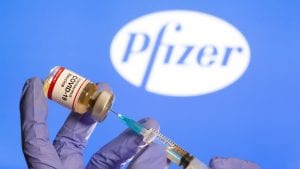Pfizer says antiviral pill cuts risk of severe COVID-19 by 89%
Summary
A trial of Pfizer Inc’s experimental antiviral pill for COVID-19 was stopped early after the drug was shown to cut by 89 percent the chances of hospitalization or death for adults at risk of developing severe disease, the company said on Friday. The results appear to surpass those seen with Merck & Co Inc’s pill …
Continue reading “Pfizer says antiviral pill cuts risk of severe COVID-19 by 89%”
A trial of Pfizer Inc’s experimental antiviral pill for COVID-19 was stopped early after the drug was shown to cut by 89 percent the chances of hospitalization or death for adults at risk of developing severe disease, the company said on Friday.
The results appear to surpass those seen with Merck & Co Inc’s pill molnupiravir, which was shown last month to halve the likelihood of dying or being hospitalized for COVID-19 patients also at high risk of serious illness.
Full trial data is not yet available from either company.
Pfizer said it plans to submit interim trial results for its pill, which is given in combination with an older antiviral called ritonavir, to the U.S. Food and Drug Administration as part of the emergency use application it opened in October.
The combination treatment, which will have the brand name Paxlovid, consists of three pills given twice daily.
The planned analysis of 1,219 patients in Pfizer’s study looked at hospitalizations or deaths among people diagnosed with mild to moderate COVID-19 with at least one risk factor for developing severe disease, such as obesity or older age.
It found that 0.8 percent of those given Pfizer’s drug within three days of symptom onset were hospitalized and none had died by 28 days after treatment. That compared with a hospitalization rate of 7 percent for placebo patients. There were also seven deaths in the placebo group.
Also Read: US FDA clears Pfizer’s COVID-19 vaccine for children
Rates were similar for patients treated within five days of symptoms – 1 percent of the treatment group was hospitalized, compared with 6.7 percent for the placebo group, which included 10 deaths.
Antivirals need to be given as early as possible, before an infection takes hold, in order to be most effective. Merck tested its drug within five days of symptom onset.
“We saw that we did have high efficacy, even if it was five days after a patient has been treated … people might wait a couple of days before getting a test or something, and this means that we have time to treat people and really provide a benefit from a public health perspective,” Annaliesa Anderson, head of the Pfizer program, told Reuters.
The company did not detail side effects of the treatment, but said adverse events happened in about 20 percent of both treatment and placebo patients.
“These data suggest that our oral antiviral candidate, if approved by regulatory authorities, has the potential to save patients’ lives, reduce the severity of COVID-19 infections, and eliminate up to nine out of ten hospitalizations,” Pfizer Chief Executive Albert Bourla said in a statement.
Infectious disease experts stress that preventing COVID-19 through wide use of vaccines remains the best way to control the pandemic, but only 58 percent of Americans are fully vaccinated and access in many parts of the world is limited.
Also Read: What happens when the COVID-19 vaccines enter the body? A road map for kids and grown-ups
Pfizer’s drug, part of a class known as protease inhibitors, is designed to block an enzyme the coronavirus needs in order to multiply.
Merck’s molnupiravir has a different mechanism of action designed to introduce errors into the genetic code of the virus. Merck has already sold millions of courses of the treatment, which was approved this week by U.K. regulators, to the United States, the U.K. and others.
Britain said earlier this month it had secured 250,000 courses of Pfizer’s antiviral.
Pfizer is also studying whether its pill could be used by people without risk factors for serious COVID-19 as well as to prevent coronavirus infection in people exposed to the virus.
(Text inputs from Reuters)

Elon Musk forms several ‘X Holdings’ companies to fund potential Twitter buyout
3 Mins Read
Thursday’s filing dispelled some doubts, though Musk still has work to do. He and his advisers will spend the coming days vetting potential investors for the equity portion of his offer, according to people familiar with the matter









 Listen to the Article
Listen to the Article  Daily Newsletter
Daily Newsletter




